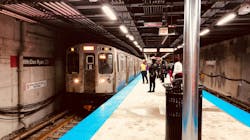CTA Board approves 2020 operating, capital budgets
The $1.57 billion operating budget has been approved by the Chicago Transit Authority (CTA) Board, which preserves existing bus and rail service levels while continuing the agency’s efforts to modernize infrastructure and improve the customer’s travel experience.
Following a decade without a state capital plan, CTA received a significant funding commitment in 2019 with the passage of the state of Illinois’ Rebuild Illinois capital bill, allowing the board to approve a balanced and responsible spending plan that reflects CTA’s commitment to keeping its services affordable for communities across Chicago. This spending plan will also help ensure that CTA continues to make improvements aimed at providing customers with faster, smoother and safer public transit services.
“CTA’s FY2020 spending plan is a sound financial blueprint that reflects forward-looking policy and operational goals that will provide our customers with the quality bus and rail service that they expect and deserve,” said CTA Board Chairman Terry Peterson. “CTA is committed to serving its customers at the highest level possible and we will continue our daily pursuit of maintaining CTA’s status as a world-class, 21st century transit system.”
Also approved by the board was a $5.1 billion, five-year capital budget for 2020-2024, which will allow CTA to continue to build upon more than $8 billion of historic transit investments completed, begun or announced since 2011. Those projects include rehabilitating rail stations and building new ones, modernizing rail and bus fleets, removing rail slow zones and adding new technologies—work that improves reliability, reduces commuting times, strengthens safety and security and improves the overall commuting experience.
“We are thankful to our board for approving our budget, which simultaneously supports our mission of providing transit services that support our customers’ needs, while keeping a vigilant eye on the bottom line,” said CTA President Dorval R. Carter, Jr. “Over the past decade, when we had no state capital program, creating a balanced budget was challenging. I am thankful to [Chicago] Mayor Lori Lightfoot and [Illinois] Gov. J.B. Pritzker for supporting legislation that provides CTA with confidence in moving forward with an ambitious capital improvement program.”
Operating budget highlights
The FY2020 budget includes more than $26 million in cost savings and operational efficiencies, including a hiring freeze affecting 200 positions—an increase of 50 positions over FY2019—and locking in power costs at historically low prices.
Since 2015, CTA has achieved approximately $170 million through similar measures and additional non-farebox revenue.
Capital budget highlights
The state of Illinois’ Rebuild Illinois capital bill provides CTA with $1.2 billion in bond funding over the next five years and includes $141.5 million in earmarked projects, including:
- Cottage Grove Green Line station overhaul ($60 million)
- Blue Line O’Hare Branch traction power improvements ($50 million)
- Blue Line O’Hare Branch station upgrades from downtown to O’Hare ($31.5 million)
CTA will also invest $310 million into the Red Line Extension (RLE) project, a $2.3-billion initiative that will extend the Red Line South by 5.3 miles and include four new, fully accessible stations at 103rd Street, 111th Street, Michigan Avenue and 130th Street. This is the single most significant funding contribution that CTA has ever made towards the RLE project and will fund engineering and design work needed to position the project to receive federal funding.
Additionally, the 2020 budget includes $78 million in funding for the All Stations Accessibility Program (ASAP), CTA’s comprehensive plan to make all rail stations 100 percent vertically accessible. Announced by Carter in 2018, ASAP is the first-ever blueprint for modernizing the 42 rail stations that are non-vertically accessible, as well as upgrading or replacing existing elevators system-wide.
Other capital projects to continue or begin in 2020 include:
- Phase One of the Red and Purple Modernization Program, which broke ground this fall and will include the construction of a rail bypass to meet current and future capacity needs. Phase One will also rebuild four Red Line stations, as well as track and signal systems;
- Your New Blue Signal Improvements;
- Delivery of 20 new electric buses; and
- Delivery of 10 prototypes of the 7000-series railcar, CTA’s newest-generation railcar.
